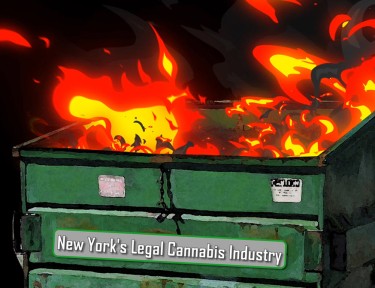
In a surprising development that echoed throughout New York’s regulated cannabis industry, a Supreme Court judge delivered a substantial setback to the state’s adult-use marijuana regulations on Wednesday. This followed a legal action initiated by Leafly Holdings last year against the Office of Cannabis Management (OCM), challenging the state’s ban on third-party advertising for cannabis retailers under free speech principles.
In a decisively worded ruling dated April 3, Judge Kevin Bryant of the Albany Supreme Court seemed to nullify a significant portion of the laws regulating adult-use marijuana in New York, deeming them “unconstitutionally vague.” Bryant criticized the OCM for providing insufficient justification for its regulatory framework, including the ban on third-party advertising.
Bryant stated that given the absence of any evidence regarding the process by which these regulations were formulated and endorsed, the Court is compelled to conclude that the determinations were arbitrary and inconsistent. Therefore, it lacks a solid and substantial basis in the record to support (OCM’s) actions.
Uncertainty and Chaos
Presently, the precise course of action remains uncertain. However, cannabis business attorneys emphasized that the ruling does not automatically render the state’s developing cannabis industry illegal.
Trying to get a comment from the Office of Cannabis Management (OCM), they did not provide an immediate response for an interview with top media outlets. Cannabis operators in the state, already on edge due to a troubled launch of adult-use sales that Governor Kathy Hochul described as a “disaster,” reacted to the ruling with a mixture of confusion and heightened anxiety.
Damien Cornwell, board president of the Cannabis Association of New York, emailed to comment that the judge seems to have invalidated ALL ADULT USE REGULATIONS in response to Leafly’s free-speech complaint. The judge may narrow his order to only address regulations concerning third-party platforms, marketplaces, or aggregators. Alternatively, he expects the OCM to appeal the decision and seek an emergency stay to enforce the judge’s ruling.
Callie Driehorst, a spokesperson for Leafly, welcomed the ruling, stating that they are pleased that the court has sided with their arguments upon reviewing the evidence. They hope this ruling prompts the New York Office of Cannabis Management to adopt a more sensible approach to promoting licensed and regulated cannabis in the state.
Little Expected To Change Soon.
In the short term, regulated cannabis businesses in New York that are already in operation or undergoing the permitting process are unlikely to experience significant changes, as attorneys informed the public.
Despite being distressing and disheartening and contributing to the existing uncertainty and chaos, Judge Bryant’s ruling does not imply that regulated marijuana enterprises are suddenly unlawful. Andrew Schriever, a partner at the Boston-based law firm Prince Lobel, specializing in cannabis law, has made this fact certain.
Schriever likened the situation to children raiding the liquor cabinet while their parents deal with a flood in the kitchen. One would hope a stay would be issued and regulations would continue until OCM and CCB (Cannabis Control Board) devise replacement regulations or another procedure.
However, the potential political consequences could be significant. Governor Hochul recently initiated a comprehensive audit of the OCM’s structure and operations, and speculations abound regarding the job security of top regulators. Meanwhile, frustrated lawmakers are expected to delve deeper into the matter.
State Senator Jeremy Cooney, chair of the Senate’s Subcommittee on Cannabis, remarked that the State Supreme Court decision was another setback in a series of blows New York’s adult-use cannabis market has faced since legalization three years ago.
While some adjustments to marketing regulations are warranted, the Court’s decision to invalidate all agency regulations will inevitably hinder progress at a critical time when we must vigorously combat illicit operations to foster a stronger, more equitable legal market.”
Latest Setback For the New York Market.
Almost three years have passed since New York state legislators enacted the Marijuana Regulation and Taxation Act (MRTA), yet the state’s regulated cannabis market remains entrenched in challenges. The process was hindered by the slow appointment of crucial positions within the Office of Cannabis Management (OCM) and its Cannabis Control Board (CCB) under former Governor Andrew Cuomo’s administration.
The rollout of legalized marijuana in New York encountered further hurdles due to a series of legal disputes, including controversies surrounding the Conditional Adult-Use Recreational Dispensary (CAURD) program, which initially prioritized licenses for social equity applicants. Despite these initiatives, as of the latest data from the OCM, only 99 businesses have been granted licenses to sell marijuana in the state.
In 2023, recreational cannabis sales in New York barely exceeded $150 million, a stark contrast to Missouri, which legalized adult-use sales approximately 18 months after New York and surpassed $1 billion in sales. Furthermore, New York hosts one of the nation’s most extensive illicit cannabis markets, with an estimated 2,000 unlicensed sellers operating solely in New York City.
This latest development will likely erode confidence in an already unstable situation. “If this decision stands, it will disrupt the entire adult-use market in New York, which has already faced delays and obstacles since the passage of the MRTA in 2021,” remarked Fatima Afia, a cannabis lawyer at Rudick Law Group in New York City.
Afia anticipates that the OCM will file an appeal, which could maintain the basic regulations while new ones are formulated. However, she noted that regardless of the outcome, the decision introduces uncertainty bound to heighten anxiety among applicants and licensees who have invested significant resources and time into the licensing process and are seeking clarity and stability.
Conclusion
In brief, a recent court ruling has disrupted New York’s legal marijuana scene. While it doesn’t instantly make the industry illegal, it compounds issues such as slow rule-making and widespread illegal sales. Prompt action is needed from politicians and regulators to address these challenges.
The future of legal cannabis in New York hangs in the balance, impacting not just businesses and regulators but also individuals who rely on it. As uncertainty looms, stakeholders eagerly await clarity and stability in the state’s cannabis market.
NEW YORK TO DOMINATE EAST COAST WEED? READ ON…
NEW YORK LEGALIZES RECREATIONAL WEED, THE NEW EAST COAST KINGPIN?
- SEO Powered Content & PR Distribution. Get Amplified Today.
- PlatoData.Network Vertical Generative Ai. Empower Yourself. Access Here.
- PlatoAiStream. Web3 Intelligence. Knowledge Amplified. Access Here.
- PlatoESG. Carbon, CleanTech, Energy, Environment, Solar, Waste Management. Access Here.
- PlatoHealth. Biotech and Clinical Trials Intelligence. Access Here.
- Source: http://cannabis.net/blog/news/new-yorks-adultuse-marijuana-regulations-are-unconstitutional-rules-supreme-court-judge-now-wha
- :has
- :is
- :not
- $1 billion
- 000
- 2%
- 2021
- 2023
- a
- absence
- Act
- Action
- actions
- address
- adjustments
- administration
- adopt
- Adult
- Advertising
- After
- against
- agency
- Aggregators
- ago
- All
- already
- also
- among
- an
- and
- Andrew
- Andrew Cuomo
- Another
- anticipates
- Anxiety
- any
- appeal
- applicants
- appointment
- approach
- approximately
- April
- arbitrary
- ARE
- arguments
- AS
- Association
- At
- audit
- automatically
- await
- Balance
- Ban
- basic
- basis
- BE
- been
- being
- Billion
- board
- bound
- business
- businesses
- but
- by
- cabinet
- cannabis
- Cannabis Industry
- certain
- Chair
- challenges
- challenging
- change
- Changes
- Chaos
- Children
- City
- clarity
- Coast
- combat
- comment
- compelled
- complaint
- comprehensive
- concerning
- conclude
- confidence
- confusion
- Consequences
- continue
- contrast
- contributing
- control
- could
- course
- Court
- critical
- criticized
- crucial
- data
- dated
- deal
- decision
- deeper
- delays
- delivered
- delve
- described
- Despite
- developing
- Development
- devise
- DID
- disaster
- disputes
- Disrupt
- disrupted
- does
- doesn
- dominate
- due
- eagerly
- East
- east coast
- echoed
- Edge
- emergency
- emphasized
- endorsed
- enforce
- enterprises
- Entire
- entrenched
- equitable
- equity
- estimated
- Ether (ETH)
- evidence
- exceeded
- existing
- expected
- expects
- experience
- extensive
- faced
- fact
- Fatima
- File
- Firm
- flood
- followed
- For
- Former
- Foster
- Framework
- Free
- Free speech
- from
- frustrated
- further
- Furthermore
- future
- get
- given
- Governor
- granted
- Group
- hangs
- Have
- he
- heightened
- hinder
- his
- hope
- hosts
- However
- HTTPS
- Hurdles
- if
- Illegal
- illicit
- immediate
- impacting
- imply
- in
- Including
- inconsistent
- individuals
- industry
- industry rules
- inevitably
- informed
- initially
- initiated
- initiatives
- instantly
- insufficient
- Interview
- into
- Introduces
- invested
- Issued
- issues
- IT
- ITS
- jeremy
- Job
- jpg
- judge
- just
- Kathy Hochul
- kitchen
- lacks
- Last
- Last Year
- latest
- launch
- Law
- law firm
- lawmakers
- Laws
- lawyer
- Legal
- Legal Action
- legalization
- legalized
- legislators
- Licensed
- licensees
- licenses
- Licensing
- likely
- looms
- made
- maintain
- make
- management
- marijuana
- Marijuana in New York
- Market
- Marketing
- marketplaces
- Markets
- Matter
- May..
- Meanwhile
- Media
- Media Outlets
- million
- mixture
- months
- more
- most
- must
- narrow
- nation
- needed
- New
- New York
- new york city
- New York state
- noted
- now
- obstacles
- of
- Office
- on
- ONE
- ones
- only
- operating
- operation
- Operations
- operators
- or
- order
- Outcome
- Outlets
- parents
- partner
- passage
- passed
- Platforms
- plato
- Plato Data Intelligence
- PlatoData
- pleased
- political
- Politicians
- portion
- positions
- potential
- precise
- president
- Prince
- principles
- prioritized
- procedure
- process
- Progress
- promoting
- prompts
- provide
- providing
- public
- reacted
- Read
- recent
- recently
- record
- Recreational
- regarding
- Regardless
- regulated
- regulating
- Regulation
- regulations
- regulations Are
- Regulators
- regulatory
- rely
- remains
- remarked
- render
- replacement
- Resources
- response
- retailers
- reviewing
- rollout
- rules
- ruling
- s
- sales
- says
- scene
- security
- Seek
- seeking
- seemed
- seems
- sell
- Sellers
- Senate
- Senator
- Series
- she
- Short
- significant
- since
- situation
- slow
- Social
- solely
- solid
- some
- Soon
- specializing
- speech
- spokesperson
- Stability
- stakeholders
- stands
- State
- stated
- stating
- stay
- stronger
- structure
- subcommittee
- substantial
- such
- support
- Supreme
- Supreme Court
- surpassed
- surprising
- Surrounding
- T
- Taxation
- term
- that
- The
- The State
- their
- Them
- therefore
- These
- they
- third-party
- this
- three
- throughout
- time
- to
- top
- Uncertain
- Uncertainty
- unconstitutional
- under
- undergoing
- unlawful
- unlicensed
- unlikely
- until
- upon
- use
- valid
- was
- we
- Wednesday
- weed
- welcomed
- were
- What
- when
- which
- while
- WHO
- widespread
- will
- with
- within
- would
- year
- years
- yet
- york
- zephyrnet












